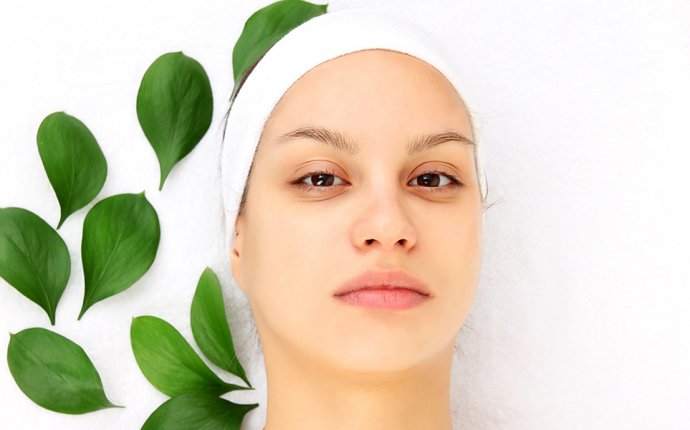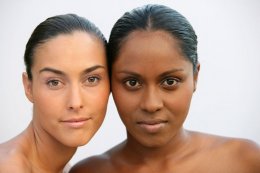
Ayurvedic Beauty
 Ayurveda has a very different approach to skin care from modern medicine. Rather than using topical agents alone like creams, lotions, and oils, ayurveda treats the underlying skin problem at its root. In ayurveda, the ancient medical system of India, the cause of skin conditions is thought to be due to a dosha imbalance. A dosha is your mind-body type. If you know your dosha, you can take steps to prevent skin problems before they even begin. There are three doshas in Ayurveda: Vata, Pitta, and Kapha. Each dosha has a unique set of characteristics.
Ayurveda has a very different approach to skin care from modern medicine. Rather than using topical agents alone like creams, lotions, and oils, ayurveda treats the underlying skin problem at its root. In ayurveda, the ancient medical system of India, the cause of skin conditions is thought to be due to a dosha imbalance. A dosha is your mind-body type. If you know your dosha, you can take steps to prevent skin problems before they even begin. There are three doshas in Ayurveda: Vata, Pitta, and Kapha. Each dosha has a unique set of characteristics.
Once you know your skin’s dosha imbalance, you can begin to fix the problem at the source.
Vata Skin
Vata skin needs to be nourished and hydrated. It is at risk for premature aging due to a deficiency of well-nourished tissues in the body. Vata skin tends to be dry, cracked, and thin. Because of its thinness, Vata skin types have easily seen blood vessels. Lips and fingernails tend to be somewhat pale due to poor circulation.
Foods to Eat
To look younger, Vata skin types should eat more whole grains, warm milk, and cooked vegetables. These are nourishing foods that are packed with nutrients and easy to digest. Also, ginger is a great food to replenish Vata skin because it helps increase metabolism and improve digestion, which impacts the color, thickness, and moisture of the skin. Get the Vata meal plan.
Herbs to Take
Ashwaganda helps to ground Vata types, who are constantly moving and tend to spread themselves out too thin. In ayurveda, By reducing the excess mental activity of Vata individuals, ashwaganda helps their gut absorb nutrients better, making the skin look younger and less wrinkled. A typical starting dose for ashwaganda is 500mg twice a day.
What to Avoid
Vata skin types should avoid raw vegetables because their digestion is not strong enough to break them down in order to get the nutrients.
Pitta Skin
Pitta skin types need to stay cool. Their skin tends to burn easily and they are more sensitive to sun exposure. A Pitta imbalance can result in rashes, acne, and other inflammatory skin conditions such as psoriasis.
Pitta skin types should eat sweet, watery fruits like melons, mangos, and pears. Think of a pot of water on high heat – Pitta evaporates the heat from your skin so you need to add foods with a high water content to keep Pitta in balance. Pitta is the exact opposite of Vata in terms of temperature, so eating foods that are cooling such as coconut oil and rose petal jam helps to reduce the skin inflammation. Get the Pitta meal plan.
There are three great herbs for balancing Pitta skin:
- Turmeric powder has powerful anti-inflammatory properties, and you can use in your cooking
- Amla berry, which is a cooling herb. You can take this as a supplement beginning at 250mg a day. It is also available in jam form.
Pitta skin gets aggravated by eating spicy foods so they should avoid foods like chilies, black pepper, and jalapenos. The heat in spicy foods further increases Pitta people’s own natural internal heat.
Kapha Skin
Kapha individuals tend to have naturally beautiful skin that ages slowly. Their skin tends to be plump and full of moisture. However, out of balance, Kapha skin tends to accumulate more toxins that predispose them to large pores, skin growths, skin eruptions, and a grayish film. The main focus for Kapha skin types should be removing toxins.
Kapha skin types should actually favor spicy foods, the exact opposite of Pitta skin types. The spicy food helps to stimulate their digestion and since Kapha individuals have the slowest metabolism, they need all the extra heat their food has to offer. Get the Kapha meal plan.
Kapha skin needs herbs that help boost metabolism to remove toxins from their body and help their skin look clearer and more vibrant. Kapha individuals should add black pepper and garlic to their meals. They should also take the supplement guggul, which helps remove toxins by regulating fat metabolism throughout the body. Start guggul at doses of 75-150 mg a day. However, don't take guggul if you are at higher risk of estrogen-sensitive cancers or are taking estrogen supplements. Also, if you are undergoing treatment or chemotherapy for cancer, discuss taking guggul or other supplements with your physician first.














